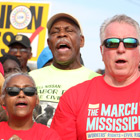
Colin Kaepernick: Athlete of the Year
“I am not looking for approval,” Kaepernick has told the media. “If they take football away, my endorsements from me, I know that I stood up for what is right.”


“I am not looking for approval,” Kaepernick has told the media. “If they take football away, my endorsements from me, I know that I stood up for what is right.”

Chris Hayes’s A Colony in a Nation seeks to elevate the Movement for Black Lives by placing it on a par with the American Revolution, but his analysis carries troubling implications.

What three seminal books by black intellectuals, all published in 1967, can teach us about fighting racism in the Trump era.

A shrewd movement strategist, Fannie Lou Hamer rose from abject poverty to reshape the American political order.

Remembering Freddie Gray, 1989–2015.

The latest acquittal of a white police officer in St. Louis reflects a pattern of policing that consistently denies equal citizenship to the county’s black residents.

The ongoing emergency of Hurricane Harvey is one that could only have been created by capitalism.

Hidden from the public and overlooked by regulators, immigrant workers in the laundry industry face a litany of hazards and abuse. Our six-month investigation reveals the extent of their exploitation.

I Am Not Your Negro shows how James Baldwin became disillusioned about the possibility of any peaceful resolution to racism, but underplays the force of his internationalist and anti-capitalist perspective.

Simon Tam, frontman of the Asian-American dance-rock band, says the recent Supreme Court ruling allowing the group to keep their name affirms that “ultimately communities should be able to determine what’s best for themselves.”

Trump’s Department of Education is proposing to take school vouchers nationwide. But this policy has an ugly segregationist history that “school choice” advocates can’t escape.

A leading organizer describes how low-wage workers and faith-based allies are fighting to raise their city’s minimum wage—even as state legislators try to stop them.

A standoff in the deep South between a black working-class community and a global auto giant reflects a broader anti-Trump resistance emerging in the labor movement.

Kim Stanley Robinson’s New York 2140 refuses the typical binary of climate change fiction, offering hope for a future somewhere in between victory or ruin.

Three labor organizers talk about their work combating racism and fighting for workers’ rights in the South.